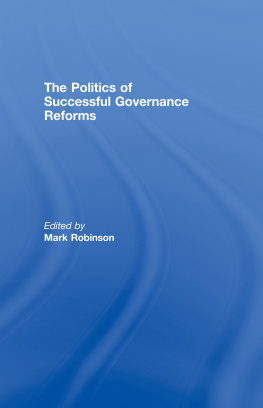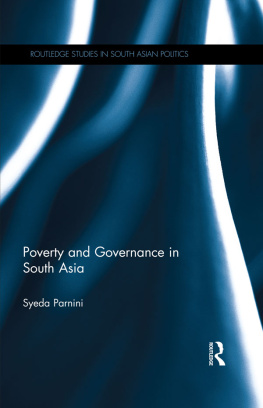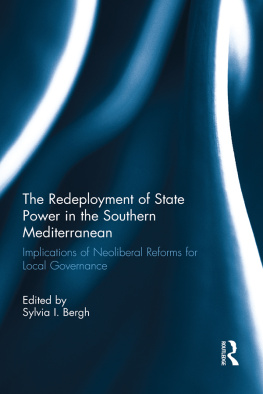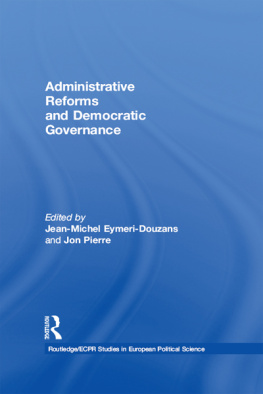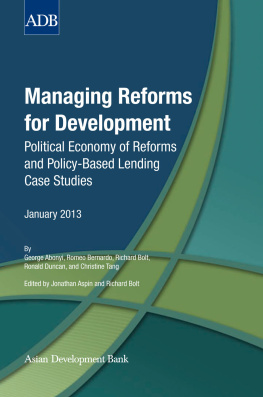The Politics of Successful Governance Reforms
This book examines the factors that give rise to successful governance reforms in developing countries, focusing on the importance of political commitment, supportive institutions, and the timing of reforms. It reviews the lessons arising from the design and implementation of successful governance reforms in Brazil, India, Uganda and other parts of Africa through comparative analysis of experience with public financial management, anti-corruption, civil service reform, and innovations in service delivery.
The contributors suggest that three factors are critical in explaining positive outcomes:
strong, consistent commitment from politicians to initiate and sustain reforms;
a high level of technical capacity and some degree of insulation from societal interests, at least in the early phases, for designing and managing reforms;
incremental approaches with cumulative benefits are more likely to produce sustainable results.
Explicit attention to the political feasibility of reform, identifying and building incentives for reform, and a more gradual and piecemeal approach are all integral to the success of future governance reforms.
This book was published as a special issue of Commonwealth and Comparative Politics.
Mark Robinson is Head of Profession for Governance and Conflict at the UK Department for International Development. At the time of the study he was Team Leader of the Governance Team at the Institute of Development Studies.
The Politics of Successful Governance Reforms
Edited by Mark Robinson
First published 2009 by Routledge
2 Park Square, Milton Park, Abingdon, Oxon, OX14 4RN
Simultaneously published in the USA and Canada
by Routledge
270 Madison Avenue, New York, NY 10016
Routledge is an imprint of the Taylor & Francis Group, an informa business
2009 Edited by Mark Robinson
Typeset in Times by Value Chain, India
Printed and bound in Great Britain by MPG Books Ltd, Bodmin, Cornwall
All rights reserved. No part of this book may be reprinted or reproduced or utilised in any form or by any electronic, mechanical, or other means, now known or hereafter invented, including photocopying and recording, or in any information storage or retrieval system, without permission in writing from the publishers.
British Library Cataloguing in Publication Data
A catalogue record for this book is available from the British Library
ISBN 10: 0-415-44569-8
ISBN 13: 978-0-415-44569-6
Contents
Mark Robinson
Anne Marie Goetz
James Manor
Mark Robinson
Aaron Schneider
Brian Levy
Mark Robinson
This volume draws together papers originally prepared for a study commissioned by the Public Sector Governance Group in the Poverty Reduction and Economic Management Network of the World Bank. We are especially grateful to Poul Engberg-Pedersen, currently Director General of the Norwegian Agency for International Cooperation, who initiated this research as senior public sector governance specialist at the World Bank. We are also grateful to other members of the Public Sector Governance Group, notably Ed Campos, Phil Keefer, Sanjay Pradhan and Randi Ryterman for their comments on earlier versions of the chapters.
The authors would also like to acknowledge the support and advice received from a number of people during the course of fieldwork. In Brazil they include Fernando Blanco, Yasuhiko Matsuda, Selena Nunes, Jose Roberto Afonso, Paulo Mauricio Teixeira Da Costa, and Jose Guilherme Reis. For the India study, we would particularly like to thank Stephen Howes and B.P.R. Vithal in the World Bank office in New Delhi, Jos Mooij and Jayaprakash Narayan in Hyderabad, Samuel Paul, M.R. Sreenivasa Murthy and Narendar Pani in Bangalore, and Jonathan Caseley and Narayana Gatty at the Institute of Development Studies. In Uganda, we would like to thank Grace Yabrudy and Sudharshan Canagarajah, respectively Country Manager and Senior Economist in the World Bank office in Kampala at the time of the study.
Finally, we are grateful to Sinnet Weber and Judy Hartley for formatting and copy-editing the final drafts.
Anne Marie Goetz is Chief Advisor for Governance, Peace and Security at UNIFEM. Prior to joining UNIFEM in 2005, she was a Professor of Political Science at the Institute of Development Studies, University of Sussex. She is the author of six books on the subjects of gender and politics in developing countries, and on accountability reforms, including Governing Women: Women in Politics and Governance in Development (2006), and Reinventing Accountability: Making Democracy Work for Human Development (Palgrave, 2005) (co-authored with Rob Jenkins).
Brian Levy currently is Adviser for Public Sector Governance in the World Bank. He is the author of Governance Reform: Bridging Monitoring and Action (World Bank, 2007), which builds on his 2006 work on governance monitoring featured in the 2006 Global Monitoring Report, Mutual Accountability: Aid, Trade and Governance. He has published numerous books and articles on the interactions between public institutions, the private sector and development in Africa, East Asia, and elsewhere, most recently editing (jointly with Sahr Kpundeh) the volume, Building State Capacity in Africa (World Bank Institute, 2004).
James Manor is the Emeka Anyaoku Professor in the Institute of Commonwealth Studies, University of London. He previously taught at Yale, Harvard and Leicester Universities, at the Institute of Development Studies, University of Sussex and the Institute for Social and Economic Change, Bangalore, India. Forthcoming books include E. Raghavan and J. Manor, Transforming Politics in Karnataka: Democracy Broadened, Deepened, Entrenched, and M. A. Melo, N. Ngethe and J. Manor, Against the Odds: Politicians, Institutions and the Struggle against Poverty.
Mark Robinson is Head of Profession for Governance and Conflict at the UK Department for International Development. He previously held appointments as Fellow and Governance Team Leader at the Institute of Development Studies, University of Sussex, and as Research Fellow for the Overseas Development in London. Mark also served as Program Officer for Governance and Civil Society in the New Delhi office of the Ford Foundation. He has published extensively on democratisation, governance, and civil society and most recently edited Budgeting for the Poor: Civil Society, Transparency and Accountability (Palgrave Macmillan, forthcoming).
Aaron Schneider is Assistant Professor of Political Science and Latin American studies at Tulane University, New Orleans. He specialises in development and public finance, with a particular interest on the way in which changing international market processes are accommodated within national political structures.
MARK ROBINSON
Achieving success in governance reform is challenging in the best of circumstances. Experience of reforms designed to improve the accountability and effectiveness of public institutions has been very mixed and the reasons behind their failure are well established. Governance reforms typically founder on account of political factors, rooted in a combination of inadequate political commitment and considerable political resistance. Such reforms run into political problems because they challenge the balance of political power by increasing accountability of politicians and reducing the scope for discretion on the part of public officials. Governance reforms also run into difficulties on account of excessive ambition, short time horizons and inadequate administrative capacity. The challenge for research is to identify the circumstances in which developing country governments successfully design and implement governance reforms.

